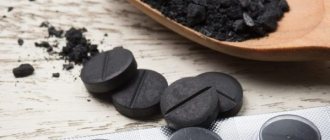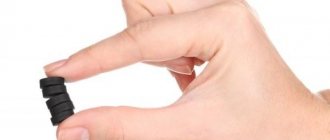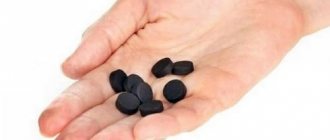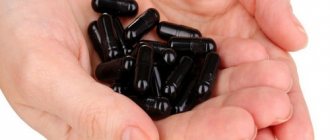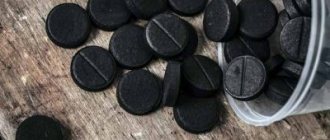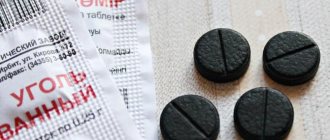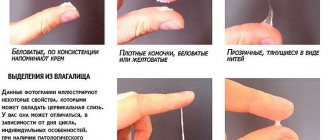Activated carbon has a reputation as a “magic pill” that helps in any unclear health situation. And this despite the “antiquity” of the drug: the pharmaceutical market now offers a large number of sorbents, but charcoal does not lose its popularity - just like 20 years ago, it is in every home medicine cabinet.
Activated carbon binds and removes toxins from the body, so it is most often used for poisoning with various medications, plant poisons and other chemicals.
- Food poisoning;
- Poisoning with alkaloids, salts of heavy metals and other chemicals;
- Drug poisoning.
It is believed that activated carbon demonstrates its highest effectiveness in the first 12 hours after poisoning. According to the instructions, the drug should be taken 1-2 grams 3-4 times a day, the maximum single dose is up to 8 grams (one tablet is 250 mg). It is not recommended to take charcoal above the prescribed dosage; this can impair the absorption of beneficial microelements and vitamins.
How not to quit gastrointestinal treatment halfway through? The reason why patients most often stop taking medicine is ridiculously banal: the package has run out, but they no longer want to go for a new one, because they feel better. We tell you how not to go astray and bring treatment to its logical conclusion. read in full »
Other indications for the use of activated carbon:
- unpleasant digestive symptoms: abdominal pain, excess gas, diarrhea;
- complex treatment of infectious diseases of the gastrointestinal tract (salmonella, cholera, typhoid fever, dysentery);
- to reduce gas formation in the intestines before ultrasound or x-ray examination;
- disorders of the liver (acute and chronic hepatitis, chronic cholecystitis, cholecystopancreatitis);
- renal failure;
- allergic reactions, dermatitis;
- to eliminate the effects of chemotherapy and radiation.
What to eat when you have diarrhea? If you have diarrhea, you should drink plenty of fluids, and when it ends, gradually introduce soft foods. It's better to start with bananas, rice, apples and toast. read in full »
Operating principle
Activated carbon or its modern analogue “Polysorb” belongs to the group of enterosorbents with a detoxifying effect. Action:
- removal of toxins, poisons, allergens;
- elimination of bacterial irritation;
- pain relief.
With deep cleaning, the concentration of free immune cells that participate in the allergic reaction decreases. Consequently, “Polysorb” effectively relieves the symptoms of the disease without affecting the mucous membrane.
Contraindications
Activated carbon should not be taken if a violation of the integrity of the mucous membrane develops in any part of the digestive tract: if the pain in acute gastritis is caused by the presence of erosions, the medication is contraindicated. After taking the medicine, the patient's stool turns black, and the stool will become similar if there is gastrointestinal bleeding. It is impossible to differentiate the pathology from a simple change in color; if there is bleeding, time will be lost to provide assistance.
The use of the drug in patients with a history of gastric or duodenal ulcers is also contraindicated.
The use of any medicine must be taken responsibly! The doctor will tell you about the need to use the medication. If you develop discomfort or pain in the stomach area, you should definitely visit a doctor, who will recommend examinations to clarify the diagnosis and prescribe adequate treatment.
Purposes of use of Polysorb
Indications for use of "Polysorb":
- preventive care for food poisoning, toxicological infection due to dysentery, salmonellosis;
- increased acidity during external and internal intoxication, developing as a result of dyspepsia, rotting and fermentation of food, extensive hypersecretion, flatulence, diarrhea;
- poisoning with alkaloids, metal salts, glycosides;
- burns with blood poisoning, purulent sepsis;
- chronic pathologies of the gastrointestinal tract, kidneys, liver, gall bladder;
- poisoning by chemicals or drugs;
- allergy;
- violation of metabolic processes;
- pain relief;
- withdrawal syndrome due to alcohol dependence;
- intoxication of cancer patients after radiation and chemotherapy;
- preparation for x-ray and endoscopic analysis to reduce gas formation in the intestines.
Indications for use
The therapeutic effect of activated carbon is determined by its natural origin. It is made from natural substances, without the use of chemical additives.
Coal can absorb various low molecular weight substances:
- toxins;
- slags;
- bile;
- gases;
- acid in gastric juice;
- alcohol.
Activated carbon refers to substances that are chemically inert. Having absorbed toxins and poisons, it is eliminated from the human body naturally approximately 12 hours after consumption. Coal is an adsorbent. Indications for use:
Coal is good to use as first aid for stomach pain.
dyspeptic processes, which are accompanied by flatulence, nausea, diarrhea;- stomach pain;
- cleansing the body of toxins and waste;
- poisoning, allergic reactions to food;
- stomach upsets;
- impaired absorption;
- preparation for ultrasound of the abdominal cavity;
- alcohol poisoning;
- for weight loss.
Stomach cleansing
The drug is used for prevention and treatment.
The procedure may be needed for preventive and therapeutic purposes. When the body suffers from severe poisoning, gastritis, it tries to get rid of toxins by vomiting. To speed up the process and alleviate the condition, you need to use activated carbon with plenty of water. Stages of cleaning with Polysorb:
- 20 tablets dissolve in water;
- the patient drinks water;
- vomiting is caused;
- repeat until the vomit is transparent.
In this case, an overdose is not dangerous, since excess sorbent comes out along with toxins. After cleaning, you need to reduce the dose of a single dose of tablets by half and continue treatment. The absorbent will improve intestinal function. The prophylactic course should be 5-7 days.
Dosage regimen for gastritis
A doctor should prescribe a regimen for taking activated carbon for gastritis. In an acute condition, it is necessary to remove the substance that has a negative effect on the digestive organs.
First, a charcoal solution is taken to lavage the stomach, taking crushed tablets diluted in water and then inducing vomiting. This procedure is carried out repeatedly.
After relief of the condition, it is recommended to take 20-30 grams once. coal, crushed and mixed in water. Next, 4 tablets are prescribed four times a day. This is necessary to remove toxins that have entered the intestines.
It is necessary to use the drug in a chronic form of the disease according to a different scheme. The drug is taken to remove excess gastric juice. As a general rule, it is recommended to take 4 tablets, crushed and mixed in water, four times daily. The duration of the course is no more than two weeks.
Advice! When taking the drug, it is very important to take into account the timing of taking other drugs, since if you take them at the same time as charcoal, there will be no therapeutic effect. The active substances of the drugs will be absorbed by the sorbent and removed from the body.
Poisoning
Advantages of using an adsorbent for poisoning:
- the possibility of maximum absorption of bacteria, their metabolic products, toxins and harmful substances with their further removal from the body;
- the product stops vomiting and diarrhea;
- coal helps reduce temperature;
- the condition improves due to the disappearance of concomitant symptoms of poisoning, such as migraines, nausea;
- wide availability of Polysorb, which can be bought at a pharmacy;
- absence of serious side effects and contraindications;
- Coal can be used at all stages and for all types of poisoning.
Properties of activated carbon
Activated carbon is an affordable drug that is an adsorbent. Most often, the drug is used for poisoning. The benefit of taking it is that charcoal has the ability to absorb toxins and remove harmful substances from the body.
Most often, the sorbent is sold in tablet form, but for a faster effect it is better to take the powder. Due to its special structure, the active absorbing surface of 1 gram of the substance is about 1000 square meters.
In this case, the substance is not absorbed into the blood; it acts exclusively within the gastrointestinal tract. Characteristics of the drug:
- the product does not injure the mucous membrane of the gastrointestinal tract, but only if the recommended dosages are observed;
Advice! The maximum amount of activated carbon that an average-sized adult can take at one time is 8 grams.
- It is well excreted from the body, the maximum elimination time is 10 hours. The rate of excretion depends on the motility of the digestive tract, that is, on the speed of food movement;
- excellent adsorbing abilities, the sorbent absorbs substances but does not enter into chemical reactions with them;
- the drug is easy to use, it is used in the form of tablets, which can be ground into powder if necessary, as well as in the form of a paste or granules;
- does not have a negative effect on the body if used correctly, and has virtually no contraindications.
The drug is prescribed in the following cases:
- flatulence;
- diarrhea;
- acute poisoning;
- food infections;
- allergic diseases;
- increased secretion of gastric juice.
Advice! Sometimes it is necessary to take activated charcoal during preparation for diagnostic studies of the abdominal organs.
Drug poisoning
They are often poisoned by drugs for fever, pain and to reduce blood pressure. Symptoms:
- heat due to increased heat transfer;
- pressure drop due to vasodilation;
- pallor;
- cold extremities, perspiration.
Before the ambulance arrives, first aid consists of rinsing and vomiting. It is better to use a probe and a solution of 1 g of sorbent per 1 kg of patient’s body weight in water. In the hospital, the blood will be purified by hemosorption. If a person falls into a coma, he is given intubation, gastric lavage and cleansing of the body with activated charcoal and a saline laxative.
Use of sorbents for chronic gastritis
If the patient’s medical history does not have a stomach ulcer, then taking activated charcoal is allowed only taking into account the amount of gastric juice and acidity. If the medicine is used by a patient who has gastritis with increased secretion, the condition will noticeably improve, since the sorbent will remove excess stomach contents that irritate its walls. It is taken as follows: four tablets dissolved in water four times a day. In this case, you need to take into account the time of taking other medications and take breaks.
Taking charcoal when diagnosing gastritis with reduced secretion will only aggravate the situation, since such patients have poor digestion of food, and the medicine will collect enzymes, gastric juice and mucus that envelops the walls of the stomach.
What to do if complications of the disease occur? Activated charcoal is prohibited for stomach ulcers, even if the patient has simple food poisoning. It turns stool black. A similar phenomenon can occur with ulcer bleeding. Therefore, taking charcoal may mask symptoms, and time will be missed to provide emergency care to the person.
For ulcers, it is better to choose other sorbing agents - smecta, polysorb, polyphepan, enterosgel.
Diarrhea
Causes:
- poisoning of any type;
- dysbacteriosis;
- avitaminosis;
- allergy;
- chronic gastrointestinal pathologies.
For diarrhea, the sorbent acts like a brush, passing throughout the gastrointestinal tract without irritating the mucous membrane. The porous structure of the drug allows molecules of harmful substances to attach to itself and remove them. Its maximum validity period is 10 hours. The remainder is displayed unchanged.
Rules of use:
- It is worth taking an aqueous suspension: 50 g of crushed coal in 150 ml of warm water;
- after some time you need to repeat the dose;
- coal reduces the effect of many drugs due to its high adsorption capacity;
- To prevent dehydration, tablets are washed down with a large volume of water;
- if the cause of diarrhea is a chronic pathology, allergy, toxic infection, it is important to apply complex treatment.
How to use for stomach inflammation
Usually, the disease of the main digestive organ is associated with errors in eating, low resistance to stress, and infections with the pathogenic bacillus Helicobacter pylori. The disease can also be provoked by the use of non-steroidal anti-inflammatory drugs, which are used in the treatment of the musculoskeletal system.
Only a doctor can prescribe the correct treatment. Often common regimens include antibiotics, acidity blockers, and antispasmodics.
But if inflammation of the gastric mucosa is caused by poisoning with chemicals, more often these are drugs, household products, alcohol, spoiled foods, activated carbon will help.
It does not have healing properties, but still remains a high-quality sorbent: it binds and removes toxins from the body, as a result of which it improves well-being.
Before taking a known adsorbent, you need to understand: it is not a medicine. Available in the form of powder and tablets of black color, porous but solid structure. It is based on carbon-containing materials, such as coal or petroleum coke, and charcoal.
For 1 gram of this substance there is up to 1500 square meters of absorbent surface, which ensures a high degree of absorption. This is important in case of food poisoning, which has negative consequences for the body. In this case, charcoal will be indispensable for gastritis. He removes everything unnecessary.
But representatives of traditional medicine offer ways to treat inflamed stomach walls with this remedy.
Important! Doctors warn: in case of exacerbation of ulcerative pathology, the adsorbent is contraindicated, its microparticles have a high density and have an aggressive effect on the mucous membranes.
For chronic gastritis and for prevention, you can drink charcoal:
- Consume before or during meals 3-4 times a day, but this course should last no more than a week. The dosage is calculated based on the patient’s weight (take 1 tablet per 10 kg).
- If you experience stomach pain, which is associated with poisoning, take charcoal in powder form. Use 2 tbsp per glass of water. l. adsorbent. They drink slowly.
- The product is washed down with plenty of liquid. This will protect you from dehydration and help speed up the absorption and elimination of toxins.
Activated carbon has a number of indications. In addition to adsorption, it helps fight diarrhea, removes excess fluid, eliminates toxins that appear due to excess stomach acid, among other things.
Important! The adsorbent substance does not affect the gastric mucosa, if it is not damaged. That is why the point of view about treating gastritis with it appeared. It is effective in case of the toxic nature of the organ disease.
But when using it, it is important to remember: the product must be removed from the intestines; in case of constipation, the sorbent, together with the absorbed toxic substances, itself poses a threat to health.
Dysbacteriosis
Violation of the composition of the intestinal microflora causes the development of a pathogenic environment suitable for the existence and activity of Candida fungi and other harmful flora. Reasons for the death of beneficial bifidobacteria, bacteroids, lactic acid bacteria and E. coli:
- chronic gastrointestinal pathologies;
- infections;
- alcoholism;
- power failures;
- unbalanced menu;
- avitaminosis;
- bad ecology;
- age characteristics;
In case of dysbacteriosis, activated carbon will absorb the decay products of microorganisms
- overwork.
Activated carbon well absorbs toxin breakdown products produced by microbes, removing them from the intestines. The absorbent helps with cramping pain.
Recipe: 1 tablet for every 10 kg of weight in 250 ml of water. After cleaning the gastrointestinal tract with a sorbent, you need to drink medications and foods rich in bifidobacteria and lactobacilli.
Use for chronic gastritis
If the patient does not have a history of stomach ulcers, it is possible to drink activated charcoal, taking into account the acidity and amount of gastric juice.
When the drug is taken by a patient diagnosed with gastritis with increased secretion, the condition will improve. The sorbent will remove excess gastric contents that irritate the stomach walls. Dosage regimen: 4 tablets dissolved in water, 4 times daily. The use of other medications and the time gap between doses must be taken into account.
If you take charcoal for gastritis with reduced secretion, the patient will become worse: the drug will remove gastric contents. In such patients, food is poorly digested, and the medication will collect gastric juice, enzymes, and mucus that envelops the walls of the stomach. Gastritis in the described situation will only worsen.
Treatment of Gastritis
The absorbent is taken for almost all types of inflammation of the gastric mucosa. The exception is the chronic form of gastritis with low secretion, since there is a risk of its further reduction:
- Acute gastritis. For treatment, you need to dilute 10 g of powder in 1 liter of water and rinse the stomach. An average of 30 g of product will be required. You can use 0.5 and 0.25 g of “Carbolene” dissolved in water. Cleaning after gastric lavage is carried out with “Carbolen”. It is taken 3 tablets with a concentration of 0.5 g in 150 ml of water up to 4 times a day for up to 7 days.
- Chronic form with high secretory activity. Charcoal helps remove excess acid from part of the gastric contents without irritating the mucous membrane. However, in this case, the sorbent removes useful substances, such as hormones, enzymes and vitamins. Therefore, absorbent therapy should not be prolonged. Dosage regimen: 2 tablets three times a day for up to 5 days.
If ulcers have formed on the walls of the stomach or bleeding is detected in the gastrointestinal tract, charcoal should not be taken, as it can lead to blockage of blood vessels. If the drug is used together with other medications, it should be taken within a two-hour interval.
Possible side effects when treating gastritis:
- constipation or diarrhea;
- blackening of the stool;
- avitaminosis;
- deficiency of hormones, fats, proteins, enzymes.
Use with caution
Activated carbon is a strong adsorbent; with prolonged and uncontrolled use, it removes useful substances from the digestive tract: vitamins, hormones, enzymes. Remain especially careful if you have heart disease; if potassium and calcium are poorly absorbed, the electrolyte balance in the heart cells is disrupted, leading to a deterioration in the patient’s condition. To avoid difficulties associated with impaired absorption of nutrients, the drug should not be taken immediately before meals. It's better an hour or two before a meal.
It is prescribed to take in short courses for up to 14 days. Then a break, after 2 weeks the course is repeated, only after consulting a doctor.
Taking enterosorbent can cause constipation or diarrhea; if there are signs of intestinal atony, there is no need to use the drug.
Pregnant women should take the drug with caution. If a woman is prone to constipation, which often happens during pregnancy, activated charcoal will aggravate the condition.
When using other medications, be sure to monitor the time interval between doses. In some situations, for example, when taking drugs that neutralize toxins, which begin to act only after absorption, the sorbent is canceled so that the carbon does not adsorb the drug.
Long-term use is necessarily accompanied by drinking plenty of fluids due to the active absorption of liquid by carbon. If the recommendations are not followed, dehydration develops.
Pregnant and lactating
Unlike most drugs prohibited during pregnancy and
The drug can be taken during pregnancy
lactation due to the risk to the fetus, activated carbon is allowed. Therefore, many diseases are treated during this period with sorbent. But you can't abuse it.
The dosage regimen for intoxication is standard - 1 capsule for every 10 kg of weight. For bloating - 1-2 g every 2 hours after meals. To adjust the dose, consult a doctor.
Help for pregnant and lactating women
During pregnancy:
- Rinsing is not recommended.
- Preventing dehydration due to the development of vomiting and diarrhea. To do this, the pregnant woman needs to drink a large amount of water - up to 1.5 liters per day.
- Charcoal cleaning - 2 tablets three times a day until the condition improves.
- Refusal to eat due to the risk of vomiting, which can trigger premature labor.
- Contact your doctor.
First aid for lactation:
- Gastric lavage with 1.5 liters of potassium permanganate solution. Induce vomiting.
- After cleansing the stomach, a solution of 1 packet of Regidron in 1 liter of liquid is given. You need to drink 1 tbsp every 15 minutes. l. during the day.
- Complete disinfection is carried out by taking 2 tablets of coal three times a day.
Activated carbon for gastritis in children
Gastritis in children is often caused by poisoning and infectious diseases. Clinically, the disease manifests itself as vomiting; without activated carbon, it will not be possible to provide assistance. For a child, a convenient form of release of the drug will not be a tablet, but a powder or paste. The required amount of medication depends on age and weight: on average, 0.05 mg per kilogram of weight three times a day. A child has the right to take enterosorbent for up to three days.
Peculiarities:
- Before giving medication to your child, you must carefully read the instructions!
- If after gastric lavage your health does not improve, call an ambulance!
Even if the child feels better after washing, you need to arrange an examination by a pediatrician to assess his health and prescribe further treatment.
If there are doubts about gastric lavage, you need to call a pediatrician at home. The child’s body quickly reacts to dehydration; one must be extremely careful for fear of missing a deterioration.
Need for consultation
Despite the harmlessness and safety of activated carbon, sometimes a doctor’s consent is needed, for example:
- chronic pathologies;
In some cases, you can take the drug after medical consultation.
- pregnancy and lactation;
- allergies;
- Age: children, elderly patients.
In these cases, adjustment of the dose and course duration is necessary. After cleansing, a vitamin-mineral complex with probiotics is prescribed.
Coal and hyperacid gastritis
If the acidity level is high, drink 3-4 tablets in the morning, at lunch and in the evening. Opinions differ regarding the integrity of the tablets. Some doctors argue that it is necessary to crush the sorbent before use, others say that grinding into powder violates the very principle of adsorption.
Important! It is better not to crush activated carbon, except in cases where it is difficult for a patient to swallow a tablet.
To eliminate the signs of gastritis with high acidity, a product in powder form is also provided. Take 10 g per glass of water and drink it in one go. After the intestines are cleansed, the course is continued for 3-4 days, drinking four tablets.
When is caution needed?
If side effects occur:
- nausea with vomiting;
- dizziness with malaise.
If adverse reactions to activated carbon occur, it is better to avoid its use.
Cleaning should not be carried out for more than 2 weeks. The optimal course required to stabilize gastrointestinal functions and improve well-being is 10 days.
A long course helps to remove beneficial enzymes and vitamins. During pregnancy, charcoal is taken in extreme cases, for example, in case of poisoning or chronic pathologies, but only after consulting a doctor.
Coal with high acidity levels
In a large number of cases, gastritis is accompanied by copious secretion of gastric juice. In this regard, the walls of the stomach become irritated, and these unpleasant sensations are always accompanied by nausea, vomiting and loss of appetite. Activated carbon in this situation is capable of:
- Reduce the secretion of gastric juice by absorbing excess active substances like a sponge;
- Rid the digestive organs of harmful microorganisms;
- Soothe irritated stomach walls.
For the effect of using a natural adsorbent to be evident, you need to use it correctly. Despite the fact that these tablets are available without a doctor's prescription and are difficult to harm the body, an overdose can only increase the pain.
Before starting treatment, you should consult with your doctor about the duration of treatment and the permitted number of charcoal tablets. By the way, powder or paste is very often consumed during the treatment period. You can prepare these medications yourself: for the first one, you need to grind the coal in a mortar, blender or coffee grinder. And to turn the mixture into a paste, just turn two tablets into powder, add a teaspoon of warm water and mix.
To treat chronic gastritis during outbreaks of exacerbation, it is necessary to rinse the stomach. And a natural adsorbent is the best assistant for this. In a liter of warm water, you need to dilute 10 grams of charcoal powder - this is about forty crushed tablets. The patient must drink the solution in a maximum of three stages. Along with vomiting, all the toxins that caused the unpleasant condition will leave the body.
You can continue to take activated charcoal throughout your illness, but no more than two weeks. The tablet is dissolved in the required amount of water and drunk several hours before meals. You can consume up to four tablets of activated carbon per day.
Activated carbon for worms - how does it work?
Treatment of helminthic infestation occurs only with the use of sorbents. Activated carbon against worms and other parasitic microbes is very helpful and affects living and dead larvae. You can start drinking charcoal on the day you take anthelmintic medications. It is important to follow the norm, and only a doctor prescribes it.
As you can see, activated carbon fully satisfies all the needs of the body of a healthy and sick person. There is practically no area where it would not be useful. However, it plays its main role in the gastrointestinal tract, and all products (almost) that affect the person as a whole pass through this system. Proper alternation of medications and the use of coal will help not only “kill” unwanted symptoms of diseases, but also prevent the causes of future diseases.
Therapy of other gastrointestinal pathologies using activated carbon
Activated carbon is considered a universal sorbent with a detoxifying effect. Due to its high ability to absorb toxins, poisons, allergens, it eliminates irritation of the gastric mucosa, including bacterial, while relieving pain. But classic tableted charcoal can be used to treat such conditions only on the recommendation of a doctor, in dosages calculated by a specialist, without exceeding the course that was prescribed to the patient.
Gastritis
Taking activated carbon for gastritis is prescribed only in the case of an infectious etiology of the inflammatory process in the stomach. It is prescribed as a sorbent when, as a result of poisoning (food, infectious or toxic), pain appears in the epigastric region, accompanied by nausea, vomiting, and fever. But, as a rule, the dosage required for such conditions is high - up to 50 g, which is 200 tablets. Even assuming that this will give a good effect, it is technically difficult to swallow such an amount of the drug in tablet or powder form.
Moreover, even at a dose of 50 g, activated carbon acts only in the first hour after poisoning. There is a chance to bind most of the toxin if this amount of medicine is taken immediately after poisoning. Subsequently, the absorption of the substance that caused acute gastritis decreases sharply:
- 30 minutes after poisoning, absorption decreases by 47.3%;
- after an hour - by 40%;
- after 2 hours - by 16.5%.
When treating acute gastritis caused by alcohol poisoning, it must be taken into account that coal practically does not bind ethanol. Based on research, the American Academy of Clinical Toxicology does not recommend the use of charcoal for poisoning:
- heavy metals;
- inorganic substances;
- caustic acids and alkalis;
- alcohols, including ethanol.
The condition will not improve, and complications such as vomiting (in 8% of those taking it), coal aspiration, and difficult diagnostics may occur.
With hypoacid and autoimmune gastritis, taking activated charcoal can lead to atrophy of the mucous membranes and a significant decrease in gastric function.
Pancreatitis
Activated carbon is not used for treatment of chronic pancreatitis. The question of the need to prescribe the drug for the chronic course of the disease is currently controversial. But most doctors consider charcoal therapy ineffective in such situations.
In acute cases, due to disruption of the enzymatic activity of the organ, medicine can be prescribed in the initial stages to cleanse the body of accumulated undigested food particles. This can happen when you overeat. In acute pancreatitis, timely administration of activated charcoal reduces dyspepsia, laxative effect, and relieves spastic pain due to its effect on excess pancreatic juice. In addition, its use for pancreatitis leads to the following:
- reduction of intoxication;
- restoration of the gastric mucosa;
- prevention of the formation of erosions and ulcers in the stomach;
- improvement of peristalsis of the digestive tract.
For pancreatitis, it is important not to overeat or overdose on the drug. Its maximum dose for an adult should not exceed one tablet per 10 kg of weight. If the dosage is too high, it is divided into several times (3-4) to avoid side effects (charcoal can be strong).
The drug is strictly contraindicated if, in addition to pancreatitis, the patient has another pathology of the digestive tract:
- erosive gastritis;
- stomach and duodenal ulcers;
- ulcerative colitis;
- injuries to the gastrointestinal mucosa;
- bleeding;
- individual intolerance.
In acute and critical conditions with pancreatitis, you can take a single dose of activated charcoal on your own. But in the future, treatment with this drug should only be carried out on the recommendation of a doctor. After completing charcoal treatment, a course of probiotics and multivitamins is required.
Flatulence
Bloating due to increased gas formation occurs most often with dysbacteriosis. In such cases, flatulence may, in addition to belching air and frequent passage of gas, be accompanied by a large accumulation of gas in the intestines with colic - a sharp paroxysmal pain in the abdomen. Flatulence is common in pregnant women and goes away without treatment after childbirth.
One of the drugs that is used in the complex therapy of this condition is activated carbon. It is prescribed in a standard dosage - 1 tablet per 10 kg of body weight three times a day. During the treatment period, you must adhere to the diet prescribed by the doctor.
Heartburn
Heartburn appears after a heavy or spicy meal. It is perceived by a person as a burning sensation behind the sternum. Most often, reflux (reflux of acidic stomach contents into the esophagus) is not a disease. But with constant irritation of the esophagus it can lead to erosions in the wall of the organ. In the future, metaplasia may occur - replacement of the esophageal epithelium with intestinal cells. A similar situation occurs with GERD - gastroesophageal reflux disease. The main symptom is the appearance of heartburn. But with GERD, in addition to chest pain, the patient may be bothered by:
- cough due to acid entering the oral cavity, and then onto the vocal cords and larynx;
- dental problems;
- development of pharyngitis, otitis, sore throat.
The reflux of acidic contents into the esophagus occurs not only with increased, but also with decreased acidity of the stomach. In the latter case, this is a sign of a functional disorder. In any case, in addition to traditional therapy with PPIs (proton pump inhibitors) and antacids, it is permissible to prescribe activated charcoal for heartburn. When it enters the lower third of the esophagus it:
- absorbs hydrochloric acid, which should not be there;
- reduces inflammation of the mucous membrane after its exposure.
Standard dosage: 1 tablet per 10 kg of body weight. Activated carbon, in addition to tablet form, is available in the form of gelatin capsules. For heartburn, it is recommended to use tablets, since the capsule dissolves only when it enters the stomach.
The tablet will act faster and more effectively if it is crushed to a powder and diluted with water or kefir to a paste-like state. In case of severe attacks of heartburn, it is recommended to drink the resulting powder with milk.
But taking charcoal for heartburn is a one-time event in exceptional cases. It can relieve heartburn for a short time, but is not able to cure it completely. Its action is symptomatic.
In the future, if heartburn recurs frequently, you should consult a doctor and get examined. This symptom may be a manifestation of a serious pathology, including the development of Barrett's esophagus. Constant irritation of the esophagus with acid causes the formation of erosions in its mucous membrane. Subsequently, in the absence of adequate treatment of the underlying disease, the cells of the esophagus are replaced by intestinal cells. This is Barrett's esophagus. It is dangerous due to further tissue restructuring - dysplasia, which is a precancerous condition.
Dysbacteriosis
Digestion of food is completed in the intestines, and vitamins and minerals are absorbed into the blood. The intestines are also involved in removing toxins, waste, and decay products from the body. When the normal microflora is disrupted, its functions are disrupted. Health problems arise as this affects the condition of the entire body.
Activated carbon will help quickly remove toxins and reduce pathological symptoms, which significantly reduce the quality of life. Dysbacteriosis manifests itself:
- poor appetite;
- constipation or diarrhea;
- nausea;
- flatulence;
- spasmodic abdominal pain (colic).
The causes of dysbiosis can be:
- intestinal infections;
- parasites;
- medicines;
- avitaminosis;
- unhealthy or stale food.
The use of activated carbon as part of complex therapy can alleviate the condition. This drug removes toxins, which helps restore normal intestinal microflora. But long-term use can worsen the condition of the intestines and the body as a whole. Therefore, it is necessary to strictly adhere to the doctor’s prescriptions. The drug is prescribed for a short course (3-4 days), after which probiotics and a vitamin complex are recommended. If dysbiosis is accompanied by constipation, activated charcoal is taken with caution: the drug can worsen constipation and, in case of overdose, lead to intestinal obstruction.
Other gastrointestinal diseases
Pathological processes occurring in the liver lead to the death of hepatocytes and disruption of the detoxification function of the organ. This occurs as a result of the accumulation of toxic breakdown products in cells due to metabolic disorders or food toxic infections, salmonellosis and other intestinal infections. To get rid of toxins and waste, activated carbon is prescribed. It also eliminates disorders that arise from acute viral and chronic hepatitis and frequent alcohol consumption. This pathology is accompanied by toxic damage to liver cells. There is an active release of fatty acids, which cause the appearance of the clinical picture of hepatitis. Coal binds them and quickly removes them from the body.
In addition, the drug adsorbs bilirubin well, which increases significantly in acute viral hepatitis, liver cirrhosis and causes jaundice with a sharp deterioration of the condition. Taking charcoal helps reduce bilirubin, remove bile acids, and with them reduce itching, jaundice, general weakness, and bind and remove cholic acids.
Activated carbon is also prescribed for liver damage after long-term use:
- hepatotoxic drugs;
- drugs capable of cumulation (accumulation) that cannot be utilized by the liver.
The dose and duration of therapy with activated carbon in case of liver damage is determined by the doctor. Due to the severity of liver damage, it is necessary to strictly follow the instructions for use of the drug.
Typically, a treatment regimen lasting 10-14 days is prescribed, then a break of 7-10 days is taken, and the cleansing is repeated. The maximum daily dose is 10 tablets, divided into 3 doses.
Activated carbon has been successfully used for hemorrhoids. It is used topically in the form of cakes made from coal powder and clay, which are applied to the external hemorrhoid. If there are internal varicose veins, a suppository made from honey and crushed coal is inserted into the anus at night.
How can activated carbon be dangerous?
As mentioned earlier, it is quite difficult to suffer from an overdose of a natural adsorbent. But such cases have also occurred in medical practice. Uncontrolled consumption of seemingly harmless activated carbon can lead to the following problems:
- Constipation or diarrhea. Excessive consumption of coal can intensify the problem in the body that was observed before starting to take the pills. Constipation can occur if, due to frequent use of the adsorbent, there is simply no fluid left in the body and there is nothing for the feces to come out with. Diarrhea can occur if charcoal is used as a medicine for acute poisoning mixed with other medications. It simply adsorbed all the substances and brought them out.
- Decreased immunity. Along with toxins, activated carbon also removes beneficial substances from the body.
- Problems with calcium deficiency. If you take charcoal and solutions made from it for more than two weeks, it will wash away all the calcium from the body, and the patient is guaranteed to start having problems with the skin, nails, etc.
- Dehydration. To prevent activated carbon from adsorbing all the water, you should drink the rinsing solution in small sips.
Painting the stool black. If this aesthetic problem has been bothering you for quite some time, you should stop using coal.
Adults know the effects of activated carbon. Many people take it without thinking about the effect and permissibility of taking it. Not everyone knows that hundreds of years ago in Ancient India, drinking water was passed through coal, settled in copper vessels and taken out into the sun, and in Ancient Egypt, the qualities of coal known to healers served as the basis for its use in medicine.
In St. Petersburg, a pharmacist discovered that alcohol can be purified with charcoal. The discovery took place in 1785. Scientists of the 19th century often did not have the opportunity to test the effect of the drug; they had to test the innovation on their own. A brave pharmacist did a similar thing in 1830, when he took strychnine and charcoal at the same time, surviving.

